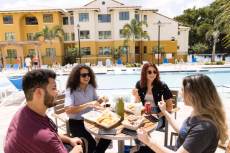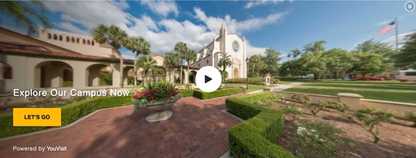Embarking with Purpose
Since 2016, the College’s EMBARK program has supported students from underrepresented backgrounds as they transition to college life and start their journeys at Rollins.
By Gigi Marino
April 19, 2023

Jaheim Morris ’24 just landed a summer internship in the residential life office at Columbia University, where he’ll help high-school students develop leadership, professional, and community-building skills as part of the university’s Summer Immersion Program. It’s a success that the communication major says wouldn’t have been possible without the support and guidance of the EMBARK program, which has tripled in size since 2018.
A student-led cohort that helps students from underrepresented backgrounds acclimate to college life, EMBARK helped Morris combat his shyness and inspired him to get involved on campus. He formed close bonds with his fellow EMBARK students and with peer mentors who imparted tips and tricks on everything from class selection to faculty teaching styles. Knowing from day one that he had support from this tight-knit community, Morris carved out a place on campus as a confident leader, serving in the Black Student Union and as an RA, working as an ambassador for the Office of Admission, and becoming a peer mentor.

“When I first came to Rollins, I could sit in front of an audience and talk, but my voice would shake because I was nervous,” he says. “But now, I can get up there and do it no problem because of the public speaking skills I’ve gained. Right now, in EMBARK, I have over 50 mentees, which is helping me develop leadership skills that I know will serve me in the future.”
The Scoop
Now in its seventh year, EMBARK was founded in 2016 as a development opportunity for students from marginalized groups—those identifying as LGBTQ+, people of color, or differently abled, to name a few. EMBARK is open to all students and begins with a special pre-orientation program, where students get to know each other before classes even start over a full two days of team-building, identity activities, and several greet-and-meets with administrators and faculty.
And that’s only the beginning. After orientation, EMBARK students continue to meet regularly throughout their time at Rollins. They get together once a month to discuss a particular issue or topic. They regularly meet with campus experts who advise them on career and life planning, studying and learning strategies, diversity issues, and more. They engage in high-impact practices such as service learning opportunities and field studies. And they share their life experiences and learn from one another via a robust student-mentoring program.
“EMBARK allows students to explore their identities in an educational environment, but also to understand how they identify in a space that is predominantly white and how to navigate those spaces,” says Sam Vega, director of the Student Center for Inclusion & Belonging. “A lot of these students are coming from underresourced and underfunded high schools. Rollins is a brand-new environment for them, and they have to adjust to a place where there are not a lot of people who look like them or speak the same language. Our No. 1 priority is academic success, and we want to make sure our students feel supported while they’re getting there.”

Snapshot
“EMBARKees” arrive at Rollins in August ahead of the rest of the incoming class. They mostly have the campus to themselves (with the exception of the Bonner Leaders cohort and a handful of international students), which gives them the opportunity to bond as a group. For the next few days, they get to know each other through ice-breakers, educational activities, sharing meals, a session on social and community engagement, and even attending a breakfast at the president’s house.
“President Cornwell wants students to be aware that there are many people on campus, including himself and his wife, Peg, who support them and want to ensure the success of all our students, especially our students from marginalized populations,” says Vega. “Most of all, he wants students to think of Rollins as their home. He invites them to share about their experiences and what they need from the school to be set up for success.”

What I’ve Learned
EMBARK student coordinator and psychology major Dani Golob ’24 explains the importance of the program’s role in encouraging safe spaces where students are supported and given a platform to express themselves without fear of reprisal. She also points to the value of “brave spaces,” which involve a tacit agreement between EMBARK students to lean into difficult conversation topics like race, power, and privilege in order to learn from one another—whether it’s in the classroom or in personal conversations.
Golob points to her multiple experiences through EMBARK for preparing her to apply for President Cornwell’s Diversity, Equity, Inclusion, & Belonging (DEIB) task force, to which she was accepted. Thanks to EMBARK, she was knowledgeable on topics of diversity, equity, and inclusion and had learned to communicate effectively around sensitive issues.
“I was able to bring my own identity and experiences onto the task force, which I most likely wouldn’t have been able to as well had it not been for EMBARK and getting to embrace and explore my identities,” says Golob. “I was able to take what I had learned in EMBARK and apply it to advocating for students as a whole.”

Indelible Impact
Carla Daza ’20, who double-majored in computer science and math and is now a data scientist at Target, is thankful to EMBARK for gifting her with a community before her Rollins journey even began.
“Having mentors who supported me academically and personally, and peers who embraced all of their identities, empowered me every day at Rollins,” says Daza. “In my postgraduate journey, EMBARK has also helped shape my values and perspective. I've recognized how necessary it is to seek and build community—at work and in my personal life. I think about the activities and discussions we engaged in around identity, privilege, and values. The world is much bigger after graduating college, and so are the disparities in people’s experiences. A core principle of EMBARK that I continue to practice today—and have grown in—is having empathy for others, especially people who are different from me.”

Did You Know?
According to research conducted by everyone from Hanover to the National Association of Student Personnel Administrators (NASPA), creating a sense of belonging and community is one of the best predictors of academic success for first-generation and underrepresented students.
- Categories:
- Embark |
- Center for Inclusion & Belonging |
- Diversity |
- Campus Life

Apply By February 1
No app fee. No formal essay or test scores required. Automatic consideration for scholarships that range from $15,000 to $32,000. It’s never been easier or more rewarding to apply to Rollins. Don't wait: apply by February 1.
Start Your ApplicationRecent Stories
December 16, 2025
From Rollins to Broadway
Juan Carlos ’23, who plays Bob Newby in the Broadway production of Stranger Things: The First Shadow, returned to campus to share what he’s learned on his journey from Rollins to theatre’s biggest stage.
December 15, 2025
Video: Rollins College Sneak Peek
From lakeside classrooms to vibrant student spaces, see where curiosity, community, and opportunity come together.
December 15, 2025
What It’s Like ... to Plan One of the World’s Biggest Events
Fueled by the endurance and adaptability she built at Rollins, Morgan Colley ’17 is helping bring the 2026 FIFA World Cup to life on the world’s biggest stage.

